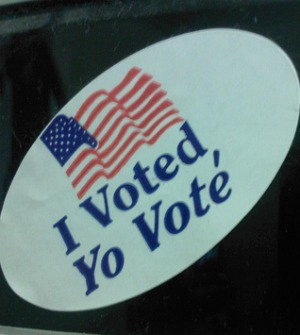Voting Rights Act Challenge: The Latino Stake
 Some people think of Section 5 of the Voting Rights Act as the ultimate weapon against discrimination and disenfranchisement at the voting booth, and it’s under attack in Federal Court. The Washington Post reports that a group of “conservative legal activists” have filed a suit and argued “that states and local jurisdictions should no longer be forced to justify voting changes to the Justice Department or a federal court.”
Some people think of Section 5 of the Voting Rights Act as the ultimate weapon against discrimination and disenfranchisement at the voting booth, and it’s under attack in Federal Court. The Washington Post reports that a group of “conservative legal activists” have filed a suit and argued “that states and local jurisdictions should no longer be forced to justify voting changes to the Justice Department or a federal court.”
The way Section 5, called the pre-clearance section, works is that selected jurisdictions in selected states (nine states, mostly in the southern US, and parts of seven others) must justify to the Justice Department or the federal court any and all changes that affect voting. A change could be as simple as the hour that polls open or close and be as complex as redistricting and ballot language rights. Voting rights activists and lawyers have successfully used this particular statute in many cases where the rights of minority voters, including Latinos, had been violated.
The challenge to the VRA comes from Shelby County, Ala., where lawyers claim that the pre-clearance section is no longer needed. According to the Washington Post, the lawyers who challenge the VRA wrote:
“it is no longer constitutionally justifiable for Congress to arbitrarily impose on Shelby County and other covered jurisdictions disfavored treatment . . . without a legislative record showing that [they] are still engaged in the type of ‘unremitting and ingenious defiance of the Constitution’ that justified enactment of the VRA in 1965.”
Here’s the thing, though, Congress has reauthorized that section of the law many times, most recently in 2006. So it’s not as if the law has been in place without review since the 1960’s. Those who challenge the law claim that congressional reauthorization has been no more than a rubber-stamp and that the need for federal intervention is a thing of the dark past, so they argued their case before a District Judge.
You can expect that this will make its way to the Supreme Court where the doors to such a challenge we left open. In 2009 the court considered the issue and kicked it down the road. The case 2 years ago involved a small utility jurisdiction in Austin and the Court ruled that such small jurisdictions have the right to challenge and “bail out” of pre-clearance. That’s where the Shelby County conservatives have hung their hats.
A part of the problem for jurisdictions that want out of pre-clearance is that the process is labor intensive and time consuming. According to the report “only 17 of 12,000 jurisdictions covered by the act – all of them in Virginia, including Fairfax City – have won such exceptions.”
Chief Justice Roberts sees the matter as one of utility; he wrote in the 8-1 2009 opinion that
Congress’s actions “raise serious constitutional questions” about whether Section 5 is still needed, or can be deemed a relic of the nation’s past.
Voter turnout and registration rates for blacks and whites now “approach parity,” Roberts wrote. “Blatantly discriminatory evasions of federal decrees are rare. And minority candidates hold office at unprecedented levels.”
For Latinos, as well as for other minority voter groups, the stake is large. There are still many places, from urban centers to rural outposts, where voting rights are to this day being defended on the basis of Section 5. But beyond that, there is the concern for the Latino diaspora. As more and more Latinos move into places such as Shelby County and others that are under pre-clearance jurisdiction, those weapons against discrimination and voting rights violations must remain intact. The problem is how do you argue against possible future infringements? The best answer is that you don’t, what you argue is the present. Which is why this case in Shelby County is important. If the “conservative activists” prevail it would open the door to similar challenges from places where Latinos may need it in years to come.
[Photo by College Park Speed and the…]

